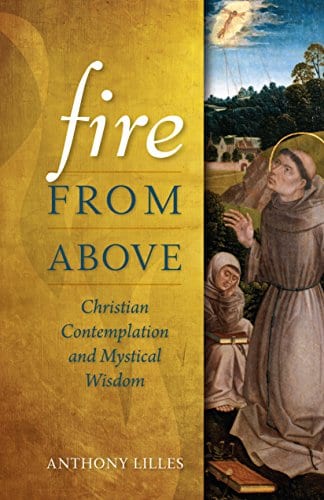“What we ask for, we receive,” Archbishop José Gomez of Los Angeles writes in his foreword to Fire from Above: Christian Contemplation and Mystical Wisdom. “We knock and the door is opened to us, and we are able to enter into the presence of the living God. We seek and we find the face of the Father, Who gives us our name and calls us to friendship.”
So how to enter into this deeper personal encounter with the Creator of the Universe? In an interview with Kathryn Jean Lopez, Anthony L. Lilles – author of Fire from Above, and academic dean of St. John’s Seminary in the Archdiocese of Los Angeles – addresses this, and talks about the deeper life of prayer.
Lopez: You write that: “Mary contemplated Jesus’ obedience on the Cross more profoundly than any other human being.” Why is this so important?
Lilles: The obedience of Jesus is the specific form of his love of the Father. To be obedient means to be completely vulnerable to the judgments and will of another. This is not a matter of being coerced or manipulated, but instead, a matter of free consent because of your trust and confidence in the other. In loving obedience, this vulnerability deepens intimacy and mutual understanding. The obedience of Jesus to the Father is therefore something very beautiful and heart rending – a mystery so rich and immense that this world is too small to contain it.
To behold or contemplate such obedience, precisely because it is so noble and good, can only be ennobling and purifying for our human existence. This is what Mary at the foot of the Cross beheld and when she beheld it, it not only ennobled her to become Mother of all believers, but through her, ennobled all of us, opening the possibility that we too might gaze on the One whom we have pierced.

“Only through suffering all kinds of trials and hardships is the love with which we pray made perfect.” Doesn’t that indicate a cruel God?
The Cross reveals Him as, not cruel, but merciful in the face of evil. His love suffers our suffering with us so that trials and hardships become one more way that He perfects our love. It was not his original plan that we should be subject to suffering and death. Yet because of the mystery of sin, all kinds of trials and hardships threaten our existence.
Nor does He make cruelty and evil magically go away. He found a way to subordinate these difficult human realities to His plan for our sake. He has transformed human suffering by entering into it so that each trial and hardship is one more instance where we can meet Him and love Him – because He is in the midst of our heartache awaiting us with love.
If we believe in His love and live in response to His goodness to us even in the midst of our trials, the glory that He created us for is revealed in us. This glory is the splendor of His love. Such an effort is very hard and even beyond our own human capacity to realize. Yet, He is there to help us realize it if we turn to Him.
True love costs and He has already paid this cost – now, in this present trial or challenge, He is giving me the opportunity to repay Him just a little for the immensity of love He has already shown me. This is never convenient or comfortable. Love that glorifies God summons all that is most good and beautiful about being human from my heart.
Yes, I fail often – but not because His love is not enough. It is rather His love that gives me another chance to love like Him. Yet even one moment of such love is so beautiful – God is always revealed in it. The Trinity permits our trials only because He is trying to teach us this kind of love. This means suffering is never meaningless. It is something filled with meaning because of what He has done for us on the Cross.

Why did John Paul II have “confidence in Divine Mercy,” and why should we?
It was his experience and the experience of his countrymen in Poland that in the end good triumphs over evil – even when it seems completely impossible. He did not meet Saint Faustina Kowalska, but he walked by her convent on his way to the Nazi rock quarry to which he was consigned for forced labor.
She died just before the war broke out with the conviction that the message of Divine Mercy was needed not only for Poland but also for the whole world. Throughout the War and afterward, people came to that convent and found hope. This seemed to have impressed him deeply. Human misery is not limitless and evil is not infinite.
It is not co-extensive with the good. Instead, the mercy of God surrounds human misery and comforts it. Saint John Paul believed in this and witnessed to it constantly. When he eventually was made the Archbishop of Krakow, part of his ministry was to promote Saint Faustina’s process for beatification so that this message would be known.
“The human person is most himself when, in hushed adoration before the heart-piercing mystery of the Trinity, he allows himself to be bathed in the sheer wonder of God’s personal presence within his heart and on that holy ground sanctions an offering of his whole existence to God as a gift in return.” That’s fine for a cloistered nun but how is this realistic for anyone else?
I know many lay people who have been pierced to the heart by God’s love and will never be able to live the same way again. God has come to them and revealed to Him the immensity of His love. When they respond to this, it is their finest moment – the decisive moment of that person’s whole life.
For me, my deepest hope is that I might be graced with such a gift before my own death — for one moment of this kind of prayer does more good in the world than anything else that we can do.
















